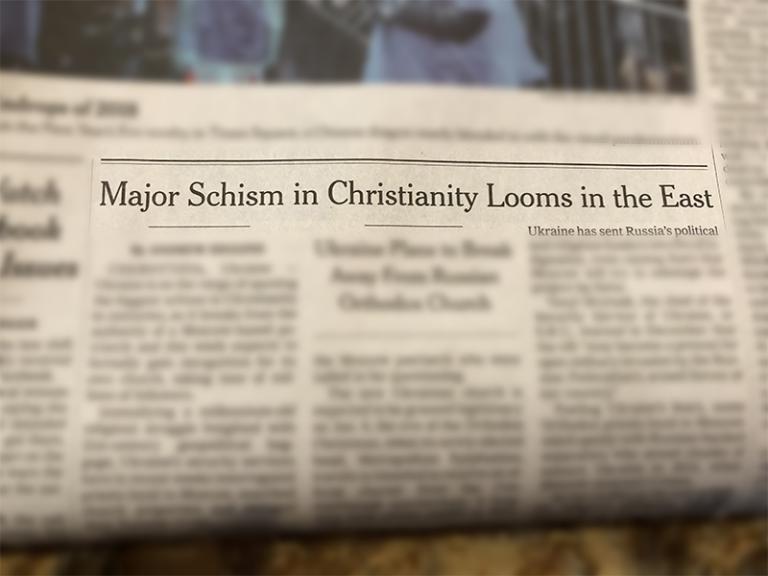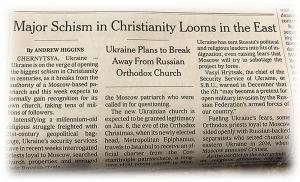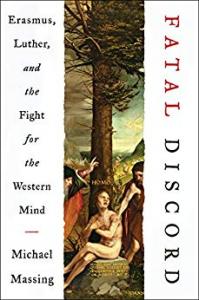What will the headline about the UMC read after General Conference 2019? Probably not much different than the one on this New Years Day, but will quote bishops, rather than patriarchs, for the comments. And it will be all about money, clothed with the language of “we are orthodox, and they are not.”

The headline grabbed my eye when I opened the New York Times today. Without reading the sub-heading, I first thought, “Oh no–the coming UMC split has now made the front page of this paper.”‘
However, this one is not about us–it’s about the split about to happen in the Eastern Orthodox Church as the Ukrainian church seeks to separate itself from the Russian “mother” church. If it does happen, the Russian church will lose about 1/3 of its members, a huge hit.
Russian dictator, Vladimir Putin, is not a happy man:
Speaking at his annual news conference in Moscow in December, Mr. Putin signaled Russia’s determination to resist the rupture, warning that any redistribution of property as part of the fissure “could turn into a heavy dispute, if not bloodshed.”
As always, the resistance is far more about the money, not about the faith. Even so, their battles sound eerily familiar:
Both Russia and Ukraine trace their origins to a 10th-century federation of Slavic peoples that embraced Christianity, called the Kievan Rus’, and are fighting to claim the mantle of Orthodoxy for themselves.
No room at the UMC inn
The proponents of a UMC split, i.e., the traditionalists who insist that there is no room at the inn for anyone who falls outside the clear demarkations of absolute binary sexuality, also “claim the mantle of Orthodoxy” for themselves.
Assuming they get their way, there will also be no room at the inn for any who stand firmly on the side of a broader understanding of God’s grace, one able to embrace a world vibrant with color and ambiguity and unanswered questions.
These are the nature of religious fights. They are perhaps less common in the Eastern Orthodox church since the original east-west split of 1054, but such fights have deep roots in the Roman Catholic heritage that most of the Western church today, including The United Methodist Church, ultimately hails from.
The Dome, part of the convention center complex in St. Louis, MO, probably should be renamed “The Arena” for a few days in late February this year. From February 23-26, spectators will watch the “gladiators,” i.e., the elected delegates, engage in a battle that will very likely lead to the schismatic death of the UMC.
I am aware that many, many reasonable voices are being raised that provide for good plans and adequate spiritual and organizational space that could keep us together.
But those who simply cannot admit to a wider orthodoxy insist that the rest of us leave. I wrote about this more extensively here in a post I called “The Mean Girl Manifesto” where I expressed my dismay at the punitive nature of the plans submitted by those self-proclaimed “orthodox” ones.
Our fights are nothing new
 Last summer, I spent several weeks reading and pondering the excellent book by historian Michael Massing: Fatal Discord: Erasmus, Luther, and the Fight for the Western Mind.
Last summer, I spent several weeks reading and pondering the excellent book by historian Michael Massing: Fatal Discord: Erasmus, Luther, and the Fight for the Western Mind.
The fight between Luther, the prototype fundamentalist thinker, and Erasmus, the prototype liberal thinker–both with unshakeable roots in the Christian traditions, both with a kind of classical knowledge most of us can’t even dream of–nearly perfectly foreshadows the fight between the “orthodox” traditionalists and the “heretical” progressives in the United Methodist Church today.
I found it a fascinating and tragic read, full of blood, hatred, intolerance, destruction, “fake news,” mud-slinging, and character assassination, all coupled with an inability to listen to the other points of view with generous and kind ears.
For me, the book was particularly compelling because the author, a Jewish historian, is not someone who was aware of current UMC issues. Massing spent ten years researching and writing the book. During that time, he read the entirety of the voluminous writings of both Erasmus and Luther.
He had no idea how their words, extensively quoted in this work, would impact those of us who now expect the same fight, the same battles over what is and what is not “orthodox” from 600 years ago, to destroy United Methodism now.
I wish everyone would read it. It’s exquisitely researched and well written, although long. And it reveals our souls.
Ultimately, Luther won—and it was his influence and his extreme hatred of Jews that sowed the seeds that eventually contributed to the German-led Holocaust. But John Wesley, the founder of Methodism, most definitely made the most of both Erasmus, with his use of classical literature to lead to wider views of God and grace, and Luther, who helped Wesley gain a greater understanding of how God goes before us and does the work leading to our salvation.
Wesley put them together, part of his patchwork but functional theological base. Our current crisis will tear them apart. John Wesley’s legacy of holding both sides in tension will likely soon disappear.
A fundamental physical reality informs our spiritual truths
There is a fundamental physical reality that none of us can escape, no matter how much wishful thinking we may practice. It is this: nothing ever stays the same. The physical world stays in flux–everything moves all the time.
This is true from the tiniest particles to the greatest of all masses–it’s all moving. With that movement, everything is changing all the time. Some of those changes are visible–like volcanic eruptions–but many are more hidden. Even so, all that movement, from the infinitely small to the infinitely massive, impacts everything else.
Awareness of the nature of constant change also offers greater awareness into the nature of our spiritual lives.
We are a long way from the biblical world
We do not live in the days/times/epochs during which the words given to us in the Bible were put down on paper or papyrus or carved in stone or repeated by generations over the campfires.
This distance does not make those words less valid or less full of truth. However, the distance means we dare not read today’s understandings into ancient texts and assume we properly understand how those truths manifest themselves today.
Below is a photo of the majority of the book of Isaiah found as part of the Dead Sea Scrolls collection. How much of this can you read–you yourself, without the interpretative changes made inevitable by the translation process? How much of the history of the time, the challenges facing the people, do you know? These are legitimate questions when opening the Holy Scriptures.

The idea that anyone, however uneducated, can take a verse, translated by someone with his (almost always male) biases, yank it from its context and pronounce it as “this is the absolute word of the Lord” is not just nonsensically preposterous. It is also without either intellectual or spiritual validity.
Yet, that is how most people hear the Bible interpreted.
Today, several isolated, poorly interpreted “clobber verses” that purport to declare any outside the sexual binary as unacceptable to God or to the church will be the weapons used to bring the UMC to its knees and rip it into pieces.
What will the headline about the UMC read after General Conference 2019? Probably not much different than the one on this New Years Day, but will quote bishops, rather than patriarchs, for the comments. And it will be all about money, clothed with the language of “we are orthodox, and they are not.”
Photographs of the January 1, 2019 print edition of the New York Times by Christy Thomas.
Fatal Discord book cover: Amazon.com
By Photographs by Ardon Bar Hama, author of the original document is unknown. – Website of The Israel Museum, Jerusalem













